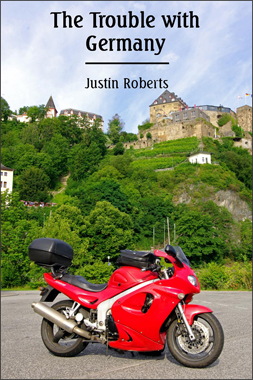 |
| Home | Articles | Books | Buy | Contact | Gallery |
 The Trouble With Germany From the history of the British Motorcycle industry to the importance of sex workers within the German economy this book attempts to join up a few of the dots that make up the bigger picture of Europe today. Frustrated by government spin and the whitewash
applied by the media over the extent and cause of the recession the
author takes a trip over to the continent to try and get a grasp of what
the modern Riding is the thinking man’s driving and here we have an excellent example of how travel by two wheels can expand the horizons through inspiration and reflection. It is an essential read for bikers wanting to gain more from their touring or anyone seeking a deeper understanding of our continental colleagues. |
 The Trouble with Germany. Published Oct 2013. Paperback, 252 pages. Click here to buy |
||||
|
Introduction
Ireland, a country whose history of human
occupation starts before anyone knows when, is defined in the eyes of
many not just by its political and economic situation but also its
social structure and the way in which it is perceived by the outside
world, should the outside world be indulgent enough to look at all. It
is little more than minor slab of rock, dating mainly from the
carboniferous period and its greater part is covered in vegetation, be
it the artificial grasslands and tillage of agriculture, the cool bogs
of the uplands or poorly drained central plain.
It
is twice as wet on its western seaboard than on the east and is at a
latitude comparable to
Living out here on Europe’s most westerly outpost I have often taken one
of the bikes, the old Daytona or newer Sprint, and ridden out to the
coast: the Burren, Sligo or Donegal and paused at the ocean edge to look
out across the gently hued water, towards the Americas which lie at that
vast distance. It is an experience to be recommended, especially away
from the height of summer when the autumn storms of the sea, blowing far
away over the horizon, are sending their shivering waves to crash in all
their powerful glory upon the open coast. Each surge a rampart of clear
water that is neither a vibrant verdant nor a deep blue, but a colour
mixed from the two on nature’s pallet and toned with maybe a touch of
grey. Every wall crowned with surf so white that the bubbles are barely
distinguishable within the mop that mounts each peak. Without respite or
break in regularity, they keep rolling in from some unseen tempest that
is playing with the ocean as we would a basin of punch. When standing at
the waters edge it is an experience that surpasses mere visual wonder,
it will fill the soul and wash from within all lesser thoughts and
emotions. It is hard to think of these as just waves, they are more
guardians, set to the task of warning us mortals that the world is large
and, ridden by the angels of foam, they drum into our conscience the
fleetingness of time and the marvel of distance. These quantifiable but
ungraspable elements of our world are to be respected for there is an
awful quantity of both lying between us and our western cousins.
Yet if I were to turn half way around to look
inland, towards the heart of the island and beyond, to Britain, the Low
Countries, the Alps and the Balkans, I’d know that the far side of
Europe is even further away than the coast of the Americas with the
eastern end of Crete being 200 miles more distant than Newfoundland.
There is a whole continent wider than the Atlantic to explore and
crossing it will take you as many miles as the well documented Route 66
will across
We would appear to live an enviable era, a
golden age of jets and motorways and yet this is not yet nirvana, there
is a tension resonating between the countries of this loose union with
the various economies running at altogether different speeds whilst
being shackled together through a common currency. The economic sense,
or lunacy, depending on your views, of such an arrangement is the
subject of many thousands of books, articles, blogs and forum threads
the world over so it would be impossible to explore all the angles in
just a week or a single book. Even so, it must be possible in some small
way to garner an impression of how the
One of the great complaints about the present
situation within the European Union is that it is dominated by just the
one country,
The present desire of European leaders, to
create a United States of Europe, mirrors that of the ambitions of one
such electorate known as the
Does all this sound familiar?
To anybody that is presently living in
Ireland and has been trying to follow the various developments as they
unfolded since the height the boom in 2006, the reflection of the
current situation can be clearly see in the mirror of history.
Five Hundred years is considered a long period of history and one could
be forgiven that the events of half a millennium ago have little effect
on current politics but I was not all sure that this was the case, so
time to go and have a look for myself.
|
|||||